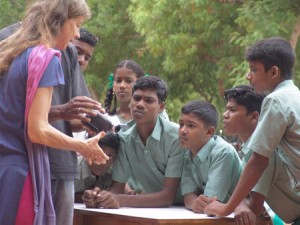
At this moment when the attention of the whole world is directed toward the possible founding of a truly universal university, we make bold to submit plans for a pedagogy of peace and planetary education as they have been conceived for Auroville.
It seems to us that whatever advantages a purely academic international university may present for the evolution of an international culture and the formation of an international body of specialists, such a university would suffer fatally from the same limitations as those which, in the eyes of our youth, make suspect even the most magnificent and best established of our national universities.
Actually what our university faculties lack most is a wide field of activity where students can put into immediate practice the abstract, theoretical ideas which have been proposed to them: a society which would be a direct extension of the university and which, instead of keeping the students in quarantine in the seats of a lecture hall, would offer them the constant and inexhaustible stimulation of a full political, economic, social and creative life. What is needed is a new system of education, one which does not limit, by entrance examinations or otherwise, the access to university life, but which opens it to everyone,to the artist and the artisan, the factory worker and the farmer, according to his tastes and capacities; a system which would enter the whole life of man—his aspiration, his work, his play—in the rhythm of his daily development.
Rather than another set of magnificent buildings with laboratories, libraries and lecture halls, there is a critical need for a new, organic and living relation between the university and society, for an open school in an open community which would put an end to the malaise of the younger generation and inaugurate an era of lifelong education for everyone.
This is why Auroville has been conceived not as a city with a university in it, but as an experimental symbiosis of university and society – a university whose first aim would be the progressive creation of a town, of a society entirely dedicated to education and the evolution of planetary man.
In order, however, to realise that miracle which will one day be lifelong education for everybody, many taboos must be overcome, and as many bridges must be built as there are now divisions, not to say abysses: between nation and nation, race and race, between school and society, between education, work and play, between university education and primary, maternal and prenatal education, between science and the humanities, between one philosophy and another, one generation and the next. It is only such bridges and conquests that will enable humanity to become reconciled to itself and its fabulous destiny, which is to transform itself ceaselessly.
Finally a great reversal of perspective is necessary, one which looks forward rather than backward. This means that we must keep a place in our hearts for the unknown, for the future, be it in the form of a new scientific or philosophical discovery, of a meeting with beings from other solar systems or even with our own children, the existence of a new space-time, or simply the presence of the infinite.
If, like adult dogs and cats, we find it difficult to play together, we can have the assurance that the puppy and the kitten who grow up together will be able to live together when they are adult, and to practise together the plays of friendship. That which little children possess spontaneously, the capacity to recognise and adopt the other, the unknown, into the unity of a native universal consciousness, we should not destroy in our schools but rather develop in appropriate educational environments. And such environments can be the fruit only of a society which is dedicated to the ideal of oneness. This, in brief, is what we consider our pedagogy of oneness.
To return to the world university itself which is the subject of this letter, let us say that only a union of the universities and other educational centres of all the countries in the world could pretend to this title. Such a union connecting all in an immense network of continuous exchange of information would enable every student in the world to profit from the best teachers and specialists, within an electronic, omnipresent and global community.
The central seat of such a universal university should not belong to any nation in particular, but to mankind as a whole. It should be a free port for new ideas, a sanctuary for youth, and a place of asylum for all those persecuted by the justice of the past and redeemed by the justice of the future, a working pilot prototype of the global world to come and a continuous source of inspiration to all.
Yvonne Artaud





